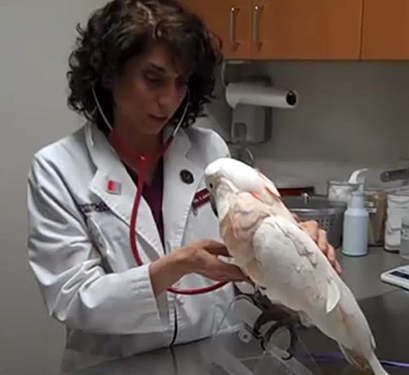
The first and most important thing a responsible bird owner can do is quarantine a new addition to their flock for roughly 6 weeks before introducing the new bird to the others. A quarantine period is the perfect time to do a New Bird Exam with your local Avian Veterinarian. A New Bird Exam is the second step for a safe flock. Normally this exam is done within the first three to seven days of a newly acquired flock member – to comply with the “warranty” period from the pet store or breeder.
There are three components of the New Bird Exam:.
History: Your Vet will want to know the origin, how long you’ve had it, gender (if gender is unknown; there is a DNA test available), the diet you’re feeding (ie, seeds or pellets, fresh fruit & veggies, supplements and treats), amount of time spent in cage, amount of time spent in natural sunlight ect. Your Vet should also be advised of any contact with other birds, direct (play date, boarding or breeder) or indirect (bulk seed from a pet shop; visiting other aviaries, bird shows or markets).
Physical: From the initial meeting your Vet will be able to discern if there are any abnormalities in the feathers, skin, eyes, beak, ears, cere or nares. It will take a hands on examination for your vet to determine if there is anything concerning about the bird’s bones, muscles, abdomen, oral cavity or vent.
Weight: A baby’s weight will fluctuate until it becomes an adult; at this time the weight should remain relatively constant. A gram scale is needed for accurate weight measurement. Your vet will record your new Parrot’s weight to compare to the species’ norm. For more information on why weighing your Parrot is so important please visit our other blog Why weigh your Parrot.
Your Vet may suggest a variety of tests. The following are two very normal tests that should not only be done during the New Bird Exam but also during their annual check-up. Fecal Gram Stain (poop test) is an important test for healthy and ill birds alike. This test must be interpreted with the history, age and condition of the bird in mind.
The other regular test is the Basic Chemistry Test that identifies levels of protein, calcium, glucose, cholesterol, uric acid and others. When the Basic Chemistry test is done, often there will also be a CBC (complete blood count) done. This test looks at the packed cell volume, plasma colour, plasma protein and white blood cell count. A test that may be performed is Psittacosis (bird fever – transmittable to humans), along with others. For a complete list with explanation of tests look at the Understanding Avian Laboratory Tests by Peter S. Sakas DVM, MS.
After the New Bird Exam, maintaining an annual checkup for all of your Parrots is highly recommended as birds are sensitive and tend to mask illness very well. Many caregivers do not notice the symptoms until it is often too late and very serious.
